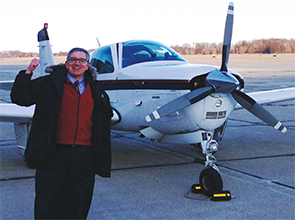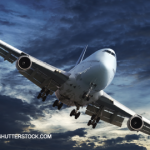
Howard Epstein, MD, vividly remembers their faces. There was the woman in her 50s with vasculitis, another in her 40s who needed surgery on her small intestine, a 30-something man with mytonic muscular dystrophy and a 13-year-old boy with a brain tumor—not to mention the handful of other sick children attending summer camp for kids with like illnesses.
On weekends, Dr. Epstein, a rheumatologist at the Cleveland (Ohio) Clinic, doubles as a pilot for Angel Flight Mid-Atlantic, which provides medical air transport for patients who need specialized medical evaluation, diagnosis, treatment or rehabilitation at medical facilities throughout Washington, D.C., Delaware, Kentucky, Maryland, Michigan, Ohio, Pennsylvania, Virginia and West Virginia. Since 2008, he has transported more than 45 patients to a variety of places on his own time and at his own expense.
Dr. Epstein will be the first to admit that he shies away from the limelight. He doesn’t want or need praise or accolades for his behind-the-scenes efforts. His life’s enjoyment, his life’s passion, is giving back to his community. Sounds a bit trite, but in his case, it’s as real as the lives he helps save.
Born to Fly
Dr. Epstein obtained his pilot’s license in the early 1970s, during the summer between high school graduation and his first year of college. In the following years, he flew to popular vacation spots like Cape Cod and Ft. Lauderdale and ate the occasional $100 hamburger—a term coined by pilots who fly out of state for lunch.
Then the demands of medical school grounded him for nearly 20 years. He didn’t fly again until 10 years into his medical career. He remembers the exact moment.
“It was a Saturday afternoon,” he recalls. “It was a really beautiful [day], and I had just finished seeing patients. I said, ‘OK, this is the time.’ I drove to the local airport … and resumed my flight training.”
His pilot license was still valid; however, his skills needed refreshing. After completing 15 hours of training with a certified flight instructor, he spent an additional four months becoming an instrument-rated pilot, learning how to fly by instruments without visual references to the ground or other landmarks. This rating allows pilots freedom to fly to more places under adverse weather conditions, such as through clouds, rain or fog.
As a graduation present, he replaced his first plane—a four-seat, single-engine Cessna 182 that he had purchased in 1998 and leased to the local flight school for pilot training—with a new Beechcraft Bonanza, a six-seat, single-engine plane that he still uses today.
“As any pilot may tell you, I think [the love of flying] is something that really never goes away,” says Dr. Epstein. “You’re kind of born with the desire to fly.”
Fate Steps In
While attending a flying seminar roughly six years ago, Dr. Epstein noticed a brochure sitting on a tabletop display that promoted Angel Flight. When he returned home, he logged onto its website and discovered that his lifelong passion could serve an even bigger purpose.
Just like physicians must be credentialed by hospitals, he had to be qualified by the organization to transport patients.
After he submitted the necessary documentation, Angel Flight qualified him in 2008, and he began transporting patients. He explains that the organization breaks up long-distance flights—usually those across several states—into legs. Pilots would then volunteer for whatever leg best suited their location. So a flight from Boston to Ann Arbor, Mich., for example, would be a three-legged trip, requiring three different pilots.
Likewise, Angel Flight staff evaluates all patients, he says, making sure they are stable, suitable for travel and have a valid, clinical need for the flight. Patients never require any type of medical attention while in the airplane. He says most of the organization’s pilots are nonphysicians.
Patients are transported to a variety of hospitals and healthcare facilities. Dr. Epstein sometimes provides door-to-door transportation. If patients are departing from the Cleveland Clinic, Dr. Epstein says, “I chauffeur patients from the clinic to the small airport I fly my plane out of to save them the trouble of having to take and pay for ground transportation to get to my airplane.”
On average, he says round-trip flights last approximately four hours, covering just under 700 miles. “For a single pilot flying without a co-pilot, four hours is plenty of time in one day to be up in the air,” he says, adding that pilots are responsible for all flight expenses—nothing is reimbursed, not even the cost for fuel.
Not all flights go as planned. During one multileg flight last winter, Dr. Epstein says the weather wasn’t cooperating, but the patient was already in the air. Dr. Epstein was supposed to pick up the patient several hours later in Lewisburg, W.Va.
“Any pilot knows that … in the Appalachian Mountains, icing is a huge concern for a small plane,” he says. “When there are icing conditions, you don’t even attempt [flying].”
Dr. Epstein realized the bad weather would prevent him from flying to Lewisburg to safely transport the patient on the last leg of his trip.
After talking with the pilot and conducting a little online research, he developed a new plan. The pilot would now land in Charlotte, N.C. Dr. Epstein then purchased a plane ticket for the patient—at his own expense—on a commercial airliner that would safely fly him the rest of the way.
For all of his efforts, Angel Flight honored Dr. Epstein last year as Pilot of the Year at an event held at the Army Navy Country Club in Arlington, Va. As he approaches retirement, he envisions many more Angel Flights in his future, providing his health remains intact.
Until then, he will continue devoting many of his weekends to Angel Flight.
“I’m the kind of person who loves to give back all the time,” Dr. Epstein says. “I do that not only in my flying, but in community activities as well. For me, it’s just part of helping make the world a better place.”
Carol Patton, a freelance writer based in Las Vegas, Nev., writes the Rheum after 5 column for The Rheumatologist.


